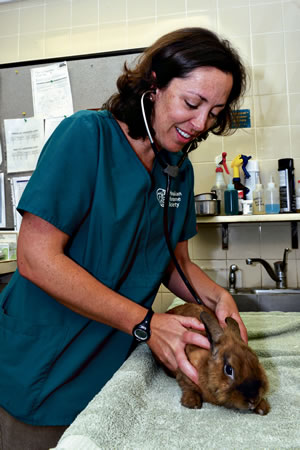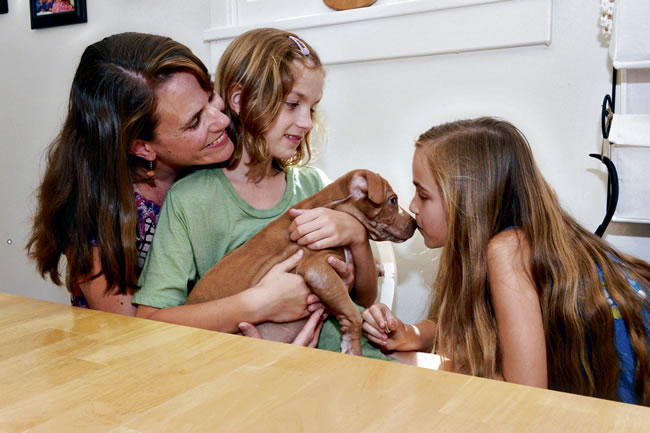Foster Care for Pets
The Hawaiian Humane Society’s volunteer foster ‘parents’ allow animals that are injured or too young for adoption time to heal and grow
Every day, animals from the Hawaiian Humane Society are being cared for by volunteer foster families before they can be placed for adoption.
Whether it’s for a kitten, puppy or a sick or injured animal, these dedicated families open up their homes and provide a place of comfort, as well as some tender loving care for these creatures in need.
Chris Vincent
In the last 12 months, 8,021 animals were adopted from the Hawaiian Humane Society. More than a quarter of those animals needed some kind of foster care.
“We’re averaging 100 animals in foster a month,” says Dr. Aleisha Swartz, chief veterinarian. “We are an open admission shelter, so we take in animals 24 hours a day, seven days a week. It doesn’t matter how old or how young, healthy or unhealthy they are. We take every animal in, so that leaves us with a number of animals that walk through our doors less than ready for adoption.”
When animals are received at the shelter, the staff of veterinarians evaluates them and identifies ones that would benefit from foster care.
“For example, we have a large number of underage kittens and puppies that come in that are not ready to be sterilized and adopted, so they need further care,” explains Swartz.
“And then we also get animals with a variety of injuries, from minor things like wounds to surgeries that need to happen, such as orthopedic surgery or animals with eye injuries that need to have their eye removed. Those animals need to have some recuperation time before they can be adopted, and it’s much better to recover in a home where they can be comfortable.”
There are on average 90 volunteers per month in the foster care program, but the number of animals in need of foster care is much greater.
“It would be really nice to get to a point where we have people on-call,” says Swartz. “Right now what we do is we get an animal and then we start looking for a person. In my ideal world I would have a list of people ready and waiting, and all you have to do is call and place them.”
The Vincent family living at Hickam Air Force Base has been fostering dogs from the Hawaiian Humane
Society since February, and say they are glad to help despite the tears that often come when it’s time to give them back.
Their most recent foster “child” is Popeye, a 3-month-old Shar Pei mix who had an eye removed. It’s hard not to fall in love with this cuddly pup, along with all the animals that become part of the family, even if for just a short time.
“Our daughter Emily really loves animals and started volunteering at the Humane Society, and then we found out about the foster program,” explains mom Chris. “They provide the food, medicine, puppy pads. The hardest part is when we give the dogs back. I ask her every time if she wants to continue to do this. She just really likes being around animals.”
Larry and Carol Jones spend their summer months in Hawaii, and have been part of the foster care program for three years, welcoming cats into their Waikiki condo. Their most recent guests were Cream and Garfunkel, who were recovering from a cold.
“When our cat Smokey died, the way we got over the grief was to go out and start fostering,” says Carol, adding that they also foster felines in California, where they live the rest of the year. “We’ve had 114 cats, and every time you get a new kitty it’s always like bringing home a new baby.
“My favorite thing about fostering is these cats come in and there’s unconditional love that they give you and you feel good about it. During the time that they’re here, they are part of our family. Also, the shelter provides free cat food, free litter, free medicine, free vet care, and if you’re going on a trip, you just let them know and you take them back. You have all the fun but none of the (long-term) responsibilities. It’s like being grandparents.”
Mostly it’s cats and dogs in foster care, but there are times when other animals such as rabbits, guinea pigs and birds are in need of a foster family, too. Volunteers can indicate their preference of animal, and even be as specific as adult dogs or tiny kittens only.
“If this program didn’t exist, if the volunteers didn’t exist, we couldn’t save as many lives as we do for sure because some of these animals wouldn’t have made it,” notes Swartz. “We’ve always had this program, but the Humane Society in the past six months has increased resources toward it. We now have a dedicated foster care coordinator. Internally we’ve made it a bigger priority than it was in the past.”
While foster families are allowed to adopt any of the animals they care for, the role of a foster care volunteer is not acquisition.
Interested volunteers are required to attend an hourlong training session, and can sign up online at hawaiianhumane.org.
“I think we’ll be doing this forever,” adds Carol “It’s a great service, but you get so much more out of it than you put into it.”







